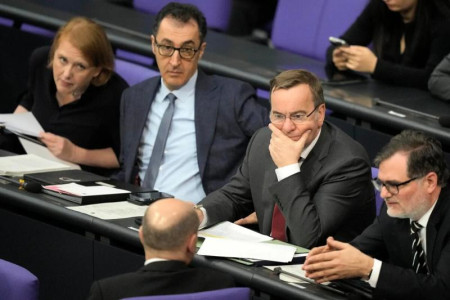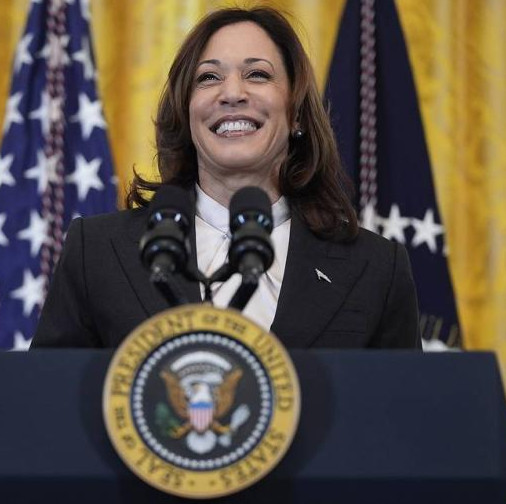
Current polls suggest that Germany’s most popular politician is Defense Minister Boris Pistorius. The one who declared the need of urgently boosting the Bundeswehr’s combat in the face of danger, i.e. a war with Russia he predicts within five to eight years. His stance has been vigorously backed by most of the country's leading politicians and, of course, the local media. To replace the loud statements about Ukraine’s undoubtful victory over Russia on the battlefield, Germany has grown confident that after defeating forces of the Kiev regime, the Russian army will definitely move to conquer the Baltic States, Poland and Germany itself.
Does the German public believe this entire propaganda hype? It seems that at least half of the country does, to a greater or lesser degree. Consistent brainwashing does its job, and the fear is gradually growing of the so-called "Russian aggression", inspired by Russophobes. As the example of Ukraine shows, reformatting public views in Germany is more than feasible, making the transformation of its fears into hatred of Russia quite a real thing. This may take the very fine to eight years Mr. Pistorius referred to.
And this reformatting has long gotten underway, these days amid NATO’s largest since 1988 Steadfast Defender 2024 exercises, with columns of heavy military equipment parading throughout Germany. This time, they will engage 90,000 troops from 31 NATO countries, over 50 ships from aircraft carriers to destroyers, 80+ fighters, helicopters and drones, and about 1.1 thousand combat machines, including 133 tanks and 533 infantry fighting vehicles. At the same time, the population of Germany is being prompted that NATO has been preparing to repel Russia’s aggression.
A study by the Bild-ordered INSA Sociological Institute features 46% of respondents concerned about the prospect of a possible Russian attack against their country. Voters of the Left Party and the CDU deem the danger higher than citizens who sympathize with the newly created Sarah Wagenknecht’s SSV party and the Alternative for Germany (AfD). Moreover, 39% said they have already started creating a strategic food reserve if there is war after all.
By the way, since the coronavirus pandemic, the German Disaster Relief and Public Protection Agency has recommended that Germans ensure a constant supply of drinking water, food and hygiene products for 10 days, regularly consuming and replenishing at the rate of 2 liters of water and 2,200 calories per person a day. And the Ministry of Food and Agriculture’s website features a special online calculator for citizens to determine the volume of necessary purchases per family. Based on data from the German, Austrian and Swiss Health Food Societies, the tool can be used to determine how much and what needs to be purchased for 28 days for a family of up to 10 people.
Meanwhile, an up-to-date study by the Institute for Public Opinion Studies in Allensbach indicates noticeable differences in situation assessments by those dwelling in Germany’s easter and western parts. The fears and concerns of the former are stronger. In general, the DPA news agency notes, Germany's involvement in military conflicts, inflation and growing disbelief in government ability to effectively run the country have made the population "feel less confident than in previous years." And Institute director Renata Keher states that "West and East Germany are currently drifting in different directions. This is an issue that gets too little attention." In her opinion, there are more people in East Germany than in the West who believe that "the world as they knew it is dying."
The Allensbach Institute study reveals that 61% of Germans feel safe, while two years ago their number was 76%. Locals regard developments in the Middle East no less dangerous than the conflict in Ukraine. 27% of respondents call Israel's actions against HAMAS "proportionate", 43% consider those "excessive", and 30% find it difficult to answer. 80% in West Germany and 53% in East Germany believe that "the greatest threat to world peace comes from Russia." Germany's involvement in military conflicts is feared by 76% of people in East Germany and only 44% in West Germany.
The growing split between East and West has been recently pointed out by leader of the Alternative for Germany (AfD) party Alice Weidel, speaking before the Bundestag. She accused Olaf Scholz’s government of being helpless and unable to address the country's economic and social problems. The politician is particularly outraged by the unprecedented defamation of her party during a series of rallies throughout Germany, allegedly "against right-wing extremism," that have been arranged by the authorities immediately after farmer protests and prior to NATO’s large-scale drills.
The rallies chose AfD to accuse of right-wing extremism, as it is "the only party in the Bundestag that stands for a peaceful settlement of the conflict in Ukraine and for normal relations with Russia," Weidel stressed. The most terrible thing is that the rallies have featured posters urging to kill AfD supporters, the party leader said. This is an attempt to do away with the key political competitor in the upcoming municipal, land and federal elections due in the next two years.
Recent polls suggest that popular support of the AfD in the country is 20-22%, while in East Germany it exceeds 30% to lead the way. This implies its runner-up status after the CDU/CSU.









